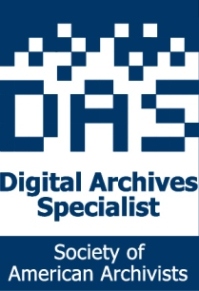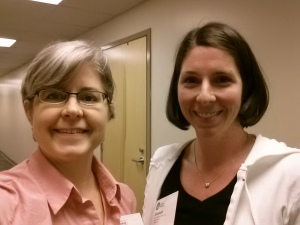 This week I attended one of the last classes that I will need for my Digital Archives Specialist certification from the Society of American Archivists. The “Appraisal of Electronic Records” class was held at the Kennesaw State University’s Center for Continuing Education on Tuesday, June 25. It was an excellent class and I will be able to use the information to help in my efforts to build an electronic records program within the school’s archives.
This week I attended one of the last classes that I will need for my Digital Archives Specialist certification from the Society of American Archivists. The “Appraisal of Electronic Records” class was held at the Kennesaw State University’s Center for Continuing Education on Tuesday, June 25. It was an excellent class and I will be able to use the information to help in my efforts to build an electronic records program within the school’s archives.
The DAS Curriculum and Certificate program was launched in 2011 to help archivists (and other interested parties) have a more systematic method for learning about digital archives and the “care and feeding” of born-digital records. The technologies surrounding these records changes so quickly that sometimes it is difficult to stay on top of the current recommendations and practices.
“The DAS Curriculum is structured in four tiers of study:
- Foundational Courses focus on the essential skills that archivists need to manage digital archives. They focus primarily, but not exclusively, on the needs of practitioners—archivists who are or will be working directly with electronic records. These courses present information that an archivist might implement in the next year.
- Tactical and Strategic Courses focus on the skills that archivists need to make significant changes in their organizations so that they can develop a digital archives and work seriously on managing electronic records. They focus primarily, but not exclusively, on the needs of managers—those archivists who manage other professionals and who oversee programmatic operations. These courses present information that an archivist might implement in the next five years.
- Tools and Services Courses focus on specific tools and services that archivists need to use for their work with digital archives. They are practical courses focused on specific software products and other tools and they focus primarily, but not exclusively, on the needs of practitioner archivists. These courses present information that an archivist could implement immediately.
- Transformational Courses focus on the skills that archivists need to change their working lives dramatically and transform their institutions into full-fledged digital archives. They focus primarily, but not exclusively, on the needs of administrators—those archivists with oversight over the entire archival enterprise of an institution. These courses present information that an archivist might implement over the course of the next ten years.” (from the SAA Website)
After each class, if the student is interested in the certification, he or she takes the online test provided by SAA. At the end of the required number of successfully-passed classes for each tier, the participant then takes the DAS comprehensive exam. The first comprehensive exam will be held in August 2013 at the SAA Conference in New Orleans, Louisiana. I began my DAS journey in August 2011 at the SAA meeting in Chicago with the class “Preserving Digital Archives: Concepts and Competencies.” Along the way I have taken some courses face-to-face, although I was thankful that some were available via webinars, making the program flexible enough to allow me to finish the courses I needed for the certification. This summer I will be reviewing all the coursework from the classes I have taken in preparation for taking the comprehensive test in August.
The other great thing about attending workshops is that you not only learn useful information that you can apply to your day-to-day work, you can also meet new colleagues. On Tuesday, I met Elizabeth Dete, School Archivist at Marist, which is an independent private Roman Catholic college preparatory school located in Brookhaven, Georgia, north of the city of Atlanta. We plan to get together soon to share ideas.
Update: I’m happy to report that in October 2013 it was announced that I passed the comprehensive exam after completing all the required coursework, and am now one of the first 14 archivists to earn this certificate. The education does not stop, however. I am continually searching out ways to learn more about digital archives.

